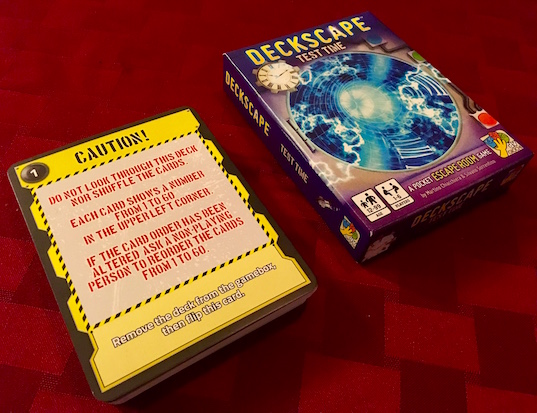Test Time is included in our recommendation guide for Tabletop Escape Games. For more of the best remote escape games in this style, check out the recommendation guide.
Flip this card.
Location: at home
Date Played: December 2017
Team size: 1-6; we recommend 2-4
Duration: 60 – 90 minutes
Price: $16 per game
REA Reaction
The two Deckscape games were fun, portable, and repackable. Plus, it’s tough to argue with the price. The two games were also too similar and shouldn’t be played in close proximity to one another. If you’re only going to play one, make it Test Time, if only because it has a more interesting and engaging final puzzle.
Who is this for?
- Families
- Puzzle lovers
- Tabletop gamers
- Any experience level
Why play?
- Lots of puzzles
- Multiple paths for parallel puzzling
- Test Time’s incredibly inventive final puzzle
- Low price
Story
Deckscape is currently available in two flavors:

Test Time
In Test Time we assisted a delightfully mad scientist in regaining control of a time machine.
The Fate of London
In The Fate of London we tracked down bombs that had been planted in the Palace of Westminster in London.
Setup
Deckscape’s structure was straightforward. We opened the box, found a deck of slightly oversized cards, and puzzled through them sequentially until the game instructed us to split the deck into multiple piles.

Once the decks split, we could parallel puzzle through the different decks, as long as we maintained the card sequence within each individual pile.
Gameplay
Deckscape delivered puzzles. Given the presentation through cards, they were heavily visual.

Some cards were puzzles; others were puzzle components to set aside and use in conjunction with other cards.

To solve a puzzle card, we’d announce our answer and flip over the card. We kept a tally of incorrect answers. At the end of the game, incorrect answers factored into a score that dictated which ending we received. (There were a few endings for each game.)

The hint system consisted of two cards with hints printed backwards on them. Each puzzle and component card was numbered. We could simply look up the puzzle number and then read the backwards hint.

Standouts
The low price.
It was easy to pick up the game and start playing. The first few cards in the deck walked through the basic rules and got us puzzling. Deckscape didn’t involve any prep work or software.

The card art was cohesive and fun. The oversizing of the cards added some heft… They just felt good.
The hint system was simple and straightforward.
Many of the puzzles were engaging and entertaining.
While the gameplay felt linear, Deckscape split the puzzles into multiple paths. This was easy to follow and kept everyone engaged.
While it was not replayable, the game could be easily reset for other people to enjoy.
The final puzzle of Test Time was fantastic and innovative.
Shortcomings
Deckscape relied too heavy on a few types of puzzles. This repetition – both within a game and between the two – grew old quickly. We played the two games in the same week and this repetition really wore on us during the second game.
Each game contained a few puzzles that were seriously obtuse. Even when we solved them, we found ourselves rolling our eyes. It almost seemed as if the game designers knew that these puzzles were cheap because they accounted for it with a late-game mechanic. If you want to know more, read the spoiler section.
At the end of each Deckscape game, we tallied up the number of incorrect answers submitted, which factored into a final score that determined which ending we’d receive. In both games, the score calculation process allowed us to disregard a certain number of incorrect answers, effectively cancelling them from the score. The allowed cancellation numbers were different between the two games. In our opinion, the number that we canceled directly correlated to the number of cheap puzzles contained within each box. These puzzles should have been improved, rather than negated in a late-game twist.
The final puzzle in The Fate of London fizzled hard. Only one person could work on it at a time. This design was both frustrating and anticlimactic.
The Deckscape tagline oversells the game: “In a Deck of cards, all of the thrills of a real Escape Room!” We found it fun, especially for the price, but temper your expectations to increase your enjoyment.
Tips for Visiting
- If you only buy one Deckscape, make it Test Time.
- If you buy both, I’d recommend letting some time pass before playing the second one. I think this is good advice for any of the boxed escape room series.
- You can easily repack these games and share them with friends.
Buy your copies of Deckscape’s Test Time & The Fate of London.
(If you purchase via our Amazon links, you will help support Room Escape Artist as we will receive a very small percentage of the sale.)

![Expedition Escape – Lucky Dice Diner [Review]](https://roomescapeartist.com/wp-content/uploads/2024/05/expedition-escape-lucky-dice-diner-3.jpg)

![The Solano Human Project [Reaction]](https://roomescapeartist.com/wp-content/uploads/2024/05/solano-human-project.jpg)
![Next Level Escape – The Show Must Go On [Review]](https://roomescapeartist.com/wp-content/uploads/2024/04/next-level-escape-show-must-go-on-1.jpg)
Leave a Reply